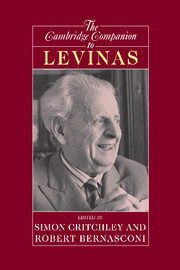Book contents
- Frontmatter
- 1 Introduction
- 2 Levinas and Judaism
- 3 Levinas and the face of the other
- 4 Levinas's critique of Husserl
- 5 Levinas and the Talmud
- 6 Levinas and language
- 7 Levinas, feminism and the feminine
- 8 Sincerity and the end of theodicy
- 9 Language and alterity in the thought of Levinas
- 10 The concepts of art and poetry in Emmanuel Levinas's writings
- 11 What is the question to which 'substitution' is the answer?
- 12 Evil and the temptation of theodicy
- Bibliography
- Index
8 - Sincerity and the end of theodicy
three remarks on Levinas and Kant
Published online by Cambridge University Press: 28 May 2006
- Frontmatter
- 1 Introduction
- 2 Levinas and Judaism
- 3 Levinas and the face of the other
- 4 Levinas's critique of Husserl
- 5 Levinas and the Talmud
- 6 Levinas and language
- 7 Levinas, feminism and the feminine
- 8 Sincerity and the end of theodicy
- 9 Language and alterity in the thought of Levinas
- 10 The concepts of art and poetry in Emmanuel Levinas's writings
- 11 What is the question to which 'substitution' is the answer?
- 12 Evil and the temptation of theodicy
- Bibliography
- Index
Summary
SINCERE . . . [. . . ad. L. sincer-us clean, pure, sound, etc. Cf. Fr. sincère (1549) . . . The first syllable may be the same as sim- in simplex: see SIMPLE a. There is no probability in the old explanation from sine cera ‘without wax’.] . . .
[Oxford English Dictionary]In Difficult Freedom and elsewhere, Levinas writes of the radically anachronistic nature of Judaism. He sees it as simultaneously the youthfulness that, attentive to everything, would change everything and the senescence that, having seen everything, would seek only to return to the origin of everything. Its difficult, if not impossible, relation to the present is bound up with its refusal of the 'modernist' imperative that one 'desire to conform to one's time'. Simultaneously youthful and aged, engaged (committed) and disengaged, such would be the figure of the prophet: 'the most deeply committed (engagé) man, one who can never be silent, is also the most separate, the one least capable of becoming an institution. Only the false prophet has an official function' (df 212). Levinas's religious (Talmudic) writings are always concerned with illustrating, rehearsing and reflecting upon this anachronistic wisdom, finding both in the Biblical expression of monotheism and in its endless rabbinical revisions and interpretations a wisdom that is absolutely irreplaceable. Irreplaceable, above all, by philosophy; but perhaps, above all, not just by any philosophy, or, rather, not by philosophy under just any name:
(T)his essential content, which history cannot touch, cannot be learned like a catechism or summarized like a credo. Nor is it restricted to the negative and formal statement of a categorical imperative. It cannot be replaced by Kantianism (kantisme). [df 213]
- Type
- Chapter
- Information
- The Cambridge Companion to Levinas , pp. 161 - 187Publisher: Cambridge University PressPrint publication year: 2002
- 7
- Cited by

